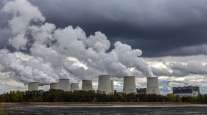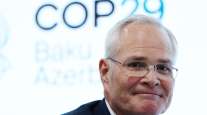Senior Reporter
Truck Makers, Suppliers Participate in Push to Address Climate Change

Heavy-duty truck makers and their major suppliers said they have been deeply involved in tackling climate change, well before heads of government met in Paris for the United Nations Climate Conference.
Their efforts include energy-saving manufacturing processes in their factories, an emphasis on remanufactured components, near-zero-emission engines, highly fuel-efficient trucks and the near elimination of landfill waste.
The manufacturers said they are likely to broaden their efforts against carbon dioxide emissions, in the wake of the U.N. conference attended by President Obama and other leaders because the possibility of danger from climate change is real and must be slowed.
“We are part of the problem and need to be part of the solution,” said Susan Alt, head of public affairs in North America for Volvo Trucks. Truck making is the largest division of Gothenburg, Sweden-based Volvo AB, a diversified manufacturer that says the transportation sector contributes significantly to greenhouse-gas emissions.
While the 12-day global warming talks were going on, Volvo announced that it had approved renewable diesel fuel — derived from biomass feedstocks, including animal fats and oils — for use in all of its proprietary Volvo engines.
The company said in a statement it was the first truck maker to endorse the use of renewable fuel, which meets the same standard specifications as petroleum diesel.
“Reducing carbon dioxide emissions is a challenge that obviously calls for a global solution,” Daimler AG, parent company of North America’s leading Class 8 manufacturer, Freightliner Trucks, told Transport Topics in a statement.
The Stuttgart, Germany-based corp¬oration added: “As part of the automotive industry, we are particularly supportive of global concepts for reducing CO2 emissions, since only global reduction strategies stand any chance of success.”
Paul Bodnar, senior director for energy and climate change on the president’s National Security Council, said during a conference call before the Paris conference that a long-term agreement on limiting emissions would put the planet on track for keeping the rise in atmospheric temperature to 3.6 degrees Fahrenheit. An increase beyond that might generate severe planetary changes, scientists have said.
“It would also show investors that the world is firmly committed to a low-carbon future, which is exactly the signal the private sector needs to go all in on renewable energy technologies, create new markets and new jobs,” Bodnar said.
Jon Mills, a spokesman for independent engine maker Cummins Inc., said the company is committed to understanding its environmental footprint and putting plans in place to reduce it. “We have a responsibility to do so,” Mills said. “Our position has been and continues to be that climate change is taking place.”
Cummins Chairman and CEO Tom Linebarger said during a keynote speech at a conference in November that the Environmental Protection Agency should set higher emissions-reduction standards to combat global warming.
“For us, we are pushing governments to make more stringent regulations,” Linebarger said. One reason for that is tough government emissions regulations here produced good results, he said. “The air is cleaner . . . and the industry is still running. It’s still doing fine. We are still moving things in trucks. It seems like it’s better.”
A second reason for advocating for tougher regulations is that Cummins believes it can win with its technology when emissions hurdles are hard and can offer a cheaper, more reliable solution than other people, he said.
Sales of its emissions-control components that reduce nitrogen oxides and particulate matter and dispense diesel exhaust fluid bring in $1 billion a year, he said, and are used with others’ engines, as well.
Meanwhile, despite clean air regulations that have kicked in over the past decade, the United States has been way behind compared with the European Union in committing to definite reductions, said Maria Gutierrez, director of corporate responsibility and sustainability at component supplier Bendix Commercial Vehicle Systems.
She said all of the sustainability-focused activities Bendix has done were initially driven by the beliefs of its corporate parent, Munich-based Knorr-Bremse AG, a global manufacturer of braking systems for rail and commercial vehicles.
When asked about those who disbelieve climate change, Gutierrez laughed then said she was an engineer who understood that data could be made to say many things.
“So whether you believe or not in global warming, it is undeniable that our operations are having, can have, an effect on the environment,” she said. “It is our responsibility to do that in the most responsible manner for the good of it all but also for a sustainable future as a business.”




